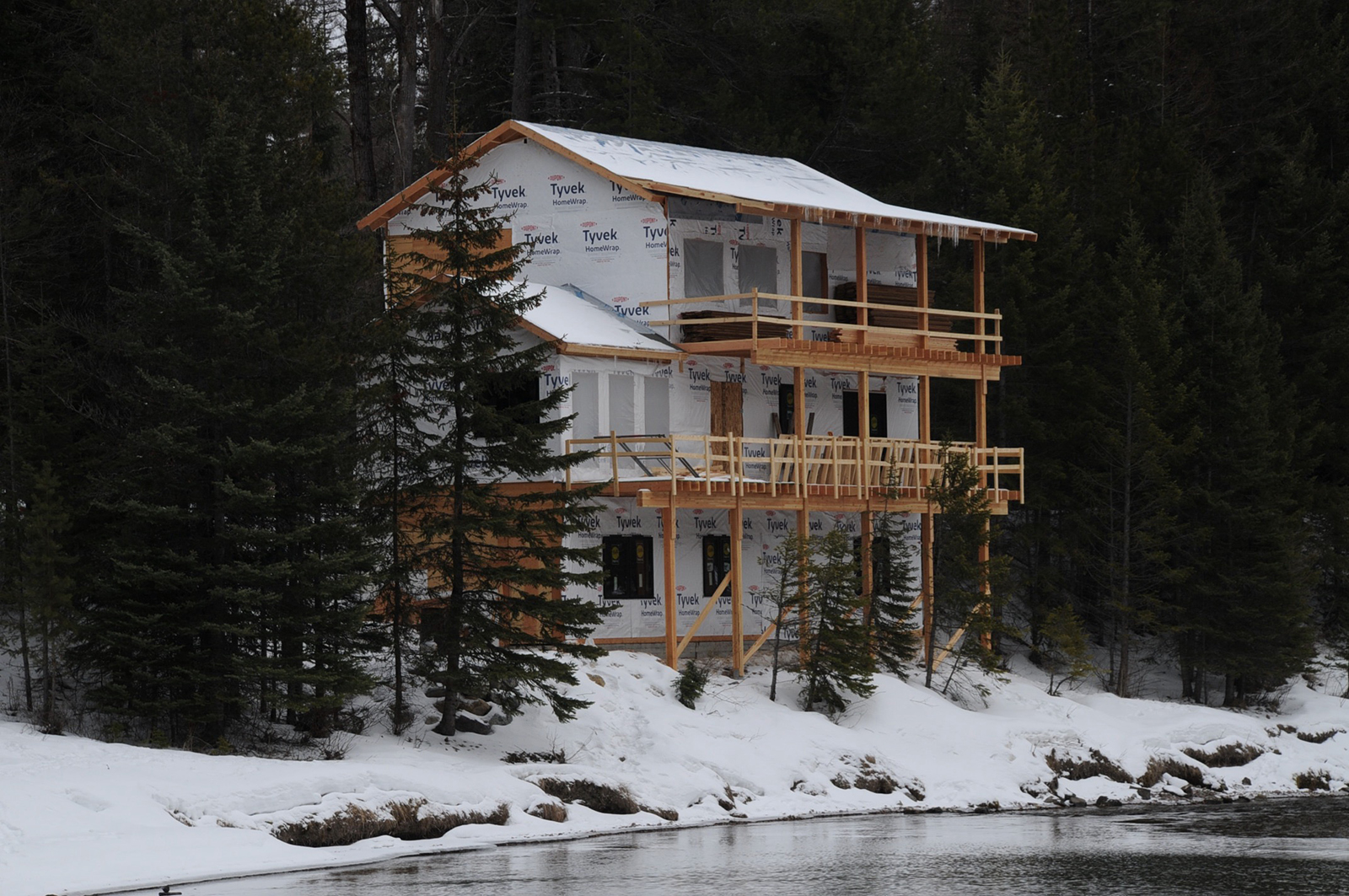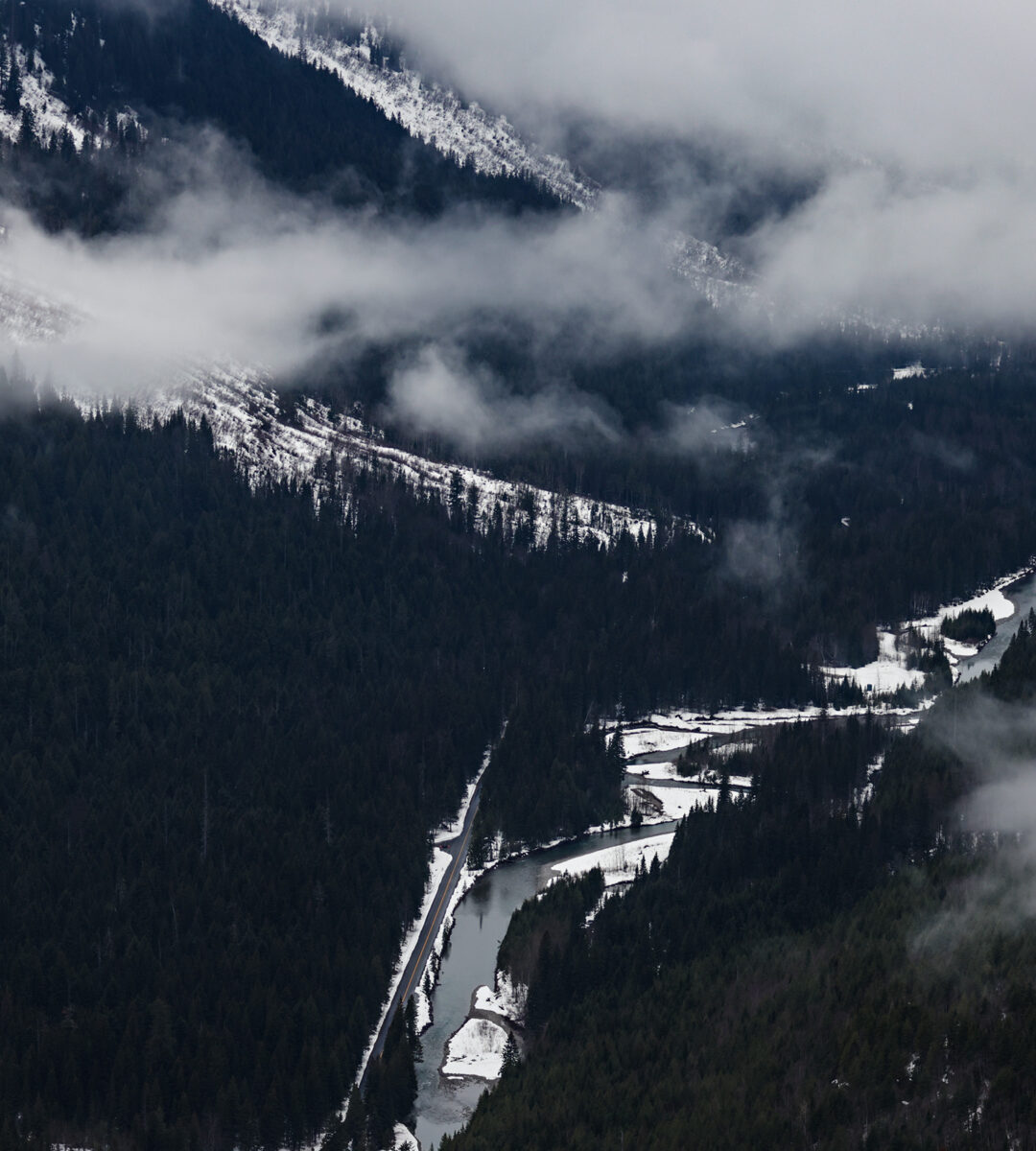Federal Judge Rules in Favor of McDonald Creek Homeowners
The order granting summary judgment to a California couple who built a home in Glacier National Park without a permit says a local conservation district has no authority to enforce Montana’s streambed law inside the park's boundaries
By Tristan Scott
A federal judge on Wednesday ruled that a California couple who built a home without a permit on the bank of McDonald Creek in Glacier National Park did so legally, and that a local conservation district that ordered the home’s demolition, as well as the damaged streambed’s restoration, has no jurisdictional authority to enforce state environmental protection laws.
For John and Stacy Ambler, the defendants in the case, the order granting them summary judgment in their lawsuit against the Flathead Conservation District (FCD) is a clear victory; however, it raises questions about which entity, if not the state of Montana, holds jurisdictional authority over private property owners who wish to develop isolated parcels within the boundaries of Glacier National Park.
Rob Farris-Olsen, an attorney representing Friends of Montana Streams and Rivers (FMSR), a group of West Glacier and Apgar residents who joined the lawsuit as intervenors in the case, both to support the FCD’s position as well as to represent themselves as stakeholders, said the order relegates the property to a sort of jurisdictional gray area.
“It’s my understanding that you cannot construct anything within a national park without a permit, and there were no permits granted in the case,” Farris-Olsen said Thursday morning after reviewing the order. “If the park has exclusive jurisdiction, I don’t know why it didn’t require a permit for the construction of the Amblers’ house. Right now it seems like there’s no real regulation over those private inholdings.”
The absence of any real regulation over private inholdings means that the Amblers’ partially completed three-story home, the construction of which the FCD’s board of supervisors placed under a cease-and-desist order in April 2023, exists in a sort of jurisdictional limbo and can remain. However, defendants have 30 days to decide whether to appeal this week’s ruling to the U.S. Court of Appeals of the Ninth Circuit, which determination Farris-Olsen said he and FCD’s counsel will make in the coming weeks after meeting with their respective clients.
In order to successfully appeal the case, however, the Ninth Circuit would have to reverse the logic it applied in a 1968 water rights case, Macomber v. Bose, in which it determined that Montana ceded, and the United States accepted, exclusive jurisdiction over privately owned land located within the boundaries of Glacier National Park.
The defendants contend that when Congress created Glacier National Park in 1910, it expressly excluded property held in private ownership prior to the park’s creation.
Based on her interpretation of the case law, to which she is bound, U.S. Magistrate Judge Kathleen DeSoto disagreed.
“Even if FMSR’s reading … is correct, its argument is in effect that the Ninth Circuit got it wrong in concluding that Montana ceded, and the United States accepted, jurisdiction over privately owned land within the boundaries of Glacier National Park,” according to DeSoto’s 42-page order, which she issued Feb. 5. “The Court is bound by Macomber, which forecloses FMSR’s argument to the contrary and makes clear that the federal government has legislative jurisdiction over private inholdings within the park, including the Ambler property.”
At the heart of FCD’s and FMSR’s argument is that the home’s location within the park’s boundaries does not preempt the enforcement of the state’s foremost streambed protection law, the Montana Natural Streambed and Land Protection Act (NSLPA). In the absence of analogous federal law, FCD attorney Camisha Sawtelle said criteria surrounding the construction of a home on a private parcel girded by National Park Service land should default to the state law’s regulatory arm.
The Amblers say only Glacier National Park can govern private inholdings, stating the FCD “cannot unilaterally reassert jurisdiction over lands to which the State of Montana long ago ceded jurisdiction to the United States.”
“The only issue in this case is federal versus state jurisdiction over the Amblers’ property,” Trent Baker, the Amblers’ attorney, wrote in their motion for summary judgment, which asked the judge to rule in favor of the couple and resolve the jurisdictional question without going to trial.
The case began locally when residents in the West Glacier area complained about the Amblers’ construction project, clearly visible to park visitors and neighbors, which prompted FCD to conduct an onsite inspection. Following the inspection, FCD determined the Amblers had violated the NSLPA (better known as the 310 law) by building on an immediate bank of McDonald Creek and excavating the stream bank to create a pad for construction, all without obtaining the necessary 310 permit, the statute’s key enforcement provision.

The FCD ruled that the Amblers must remove the home and remediate the streambed. However, the couple challenged the FCD’s jurisdictional authority in the case and proceeded to what’s called a declaratory ruling process, which was overseen by hearing officer Laurie Zeller, a retired bureau chief with the Montana Department of Natural Resources and Conservation (DNRC).
After reaffirming its jurisdictional authority, Zeller remanded the case back to the FCD, whose Board of Supervisors ruled that the couple must remove the home and repair the streambed no later than April 1, 2024.
Instead, the Amblers filed lawsuits in state and federal courts, arguing that the FCD overstepped its authority by ordering the home’s removal. As the legal saga drags on, the unfinished home remains visible to onlookers from the Camas Road.
The question at the center of last month’s oral arguments was whether FCD has jurisdiction to enforce the 310 law, which states that any private individual or entity proposing work in or near a stream that “physically alters or modifies the bed or immediate banks of a perennial-flowing stream” must first obtain an approved permit from the local conservation district.
According to the Amblers, neither Flathead County nor Glacier National Park required any permits to begin construction on the property and connect the residence to the Apgar Village water and sewer system.
“Glacier National Park allowed the construction and allowed the Amblers to connect to the Apgar Village water and sewer system,” the federal complaint from the plaintiffs states. “The Amblers dispute that the FCD has jurisdiction over the property and dispute that the NSLPA applies to the property.”
The defendants contend that even if the private parcel is under exclusive jurisdiction of the federal government, the construction of a home on the immediate bank of a perennial stream without a permit constitutes a nuisance under federal law, violates the National Environmental Policy Act and violates a federal statute providing that “no permit, license, lease or other authorization” shall be granted for the erection and maintenance of summer homes or cottages within Glacier National Park.
They also argue that state entities have jurisdiction to enforce the Streambed Act on private inholdings because the statute is consistent with the purpose for which Glacier National Park was created.
But DeSoto in her order wrote those arguments “go beyond the scope of the sole claim asserted in the complaint … that FCD lacks jurisdiction over the Ambler property, and that the Streambed Act does not apply.”
“In sum, the Court concludes that FCD lacks jurisdiction to enforce the Streambed Act on the Ambler Property because Montana has ceded exclusive jurisdiction over all land within the boundaries of Glacier National Park — including private inholdings — to the federal government,” according to DeSoto’s order.
“In reaching this conclusion, the Court is bound by the Ninth Circuit’s decision in Macomber, which held that Montana’s cession of jurisdiction over Glacier National Park included not only the public lands dedicated to park purposes by the United states but all privately owned lands within the described park boundaries,” DeSoto wrote, adding that “by this cession and acceptance, federal authority became the only authority operating within the ceded areas.”
Although state law “theretofore applicable within the ceded area at the time of the cession was assimilated as federal law … the Streambed Act was not in effect at the time of the cession and was not assimilated for the reasons explained above,” DeSoto wrote in the order. “Accordingly, under binding Ninth Circuit precedent, FCD lacks jurisdiction to enforce the Streambed Act on the Amblers’ private inholding within Glacier National Park.”